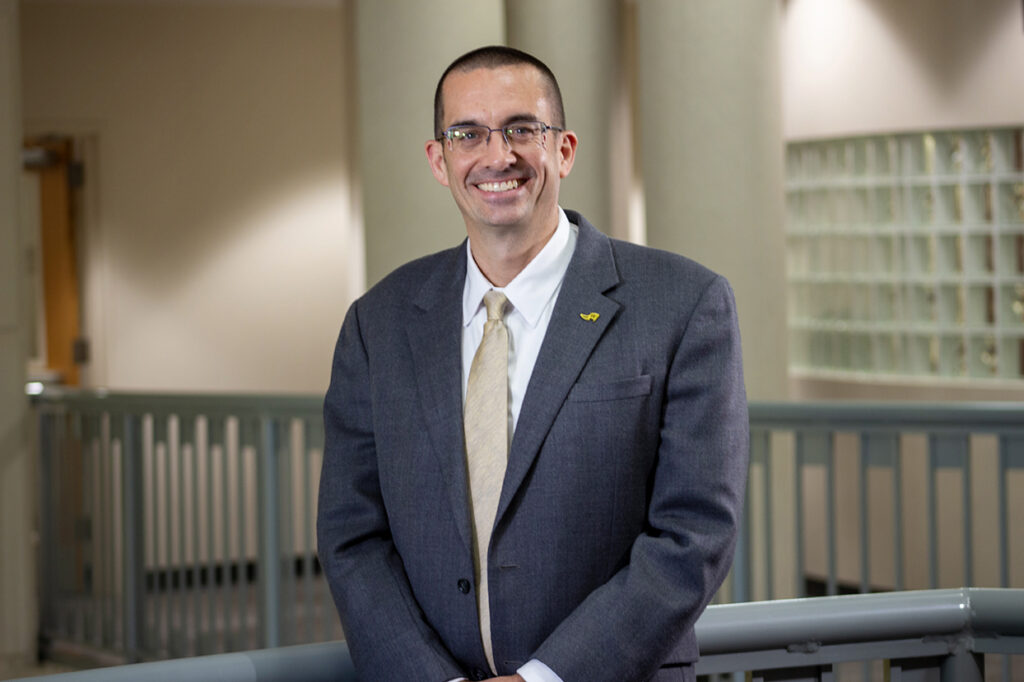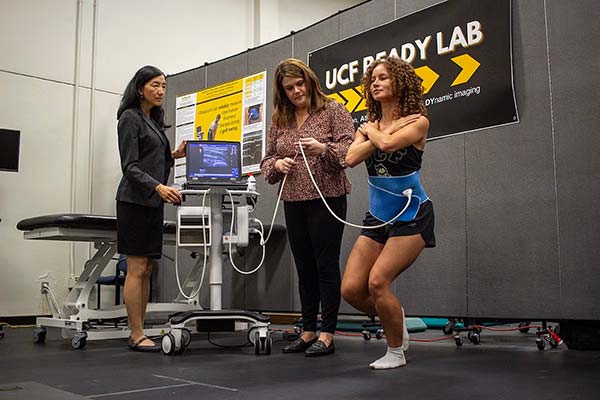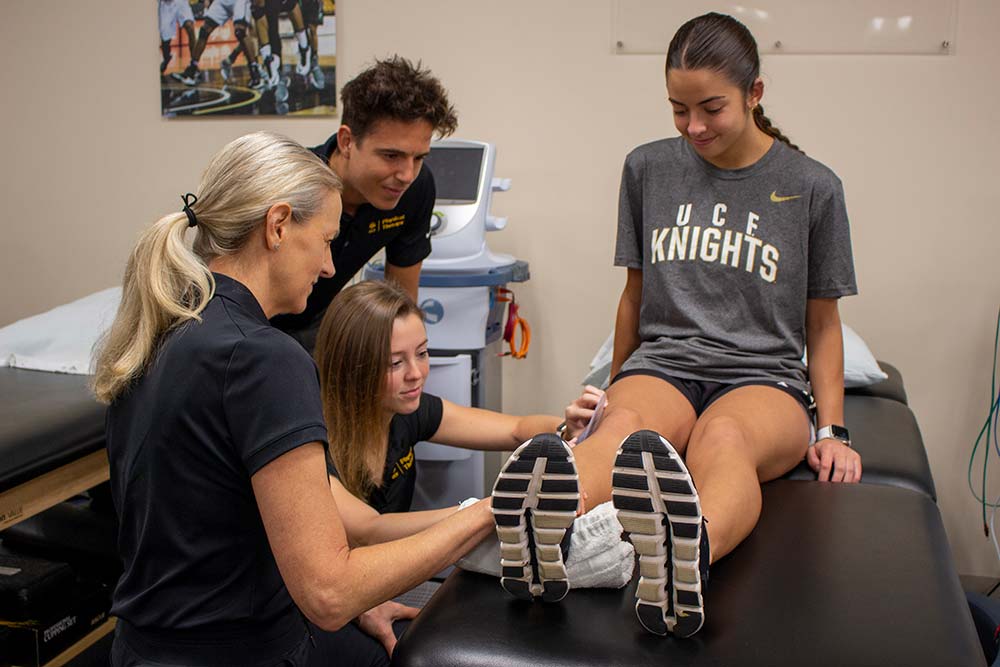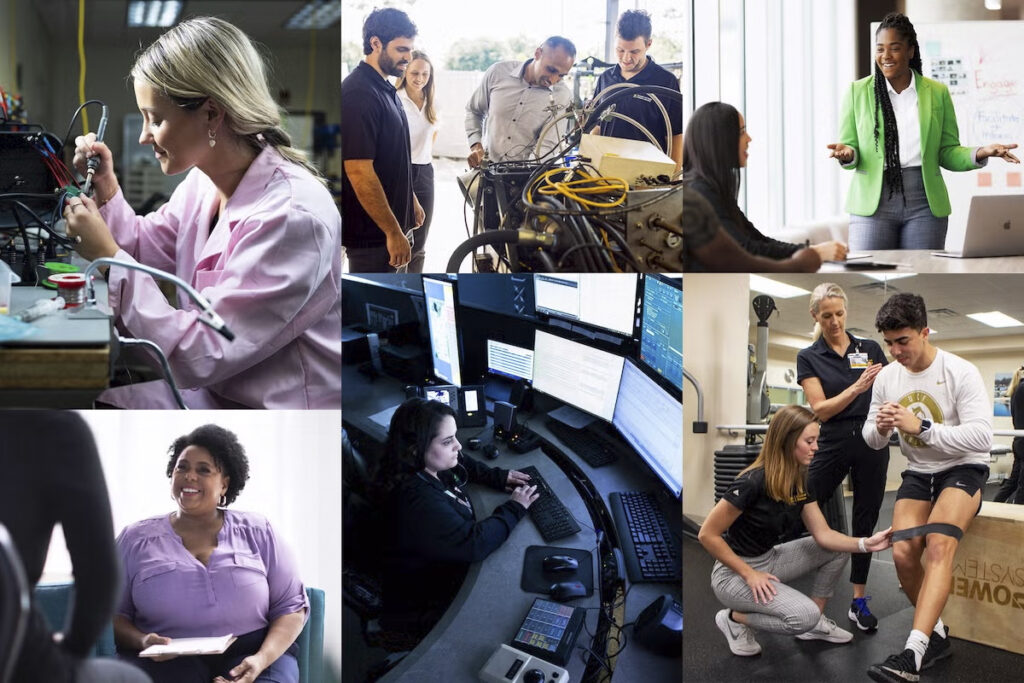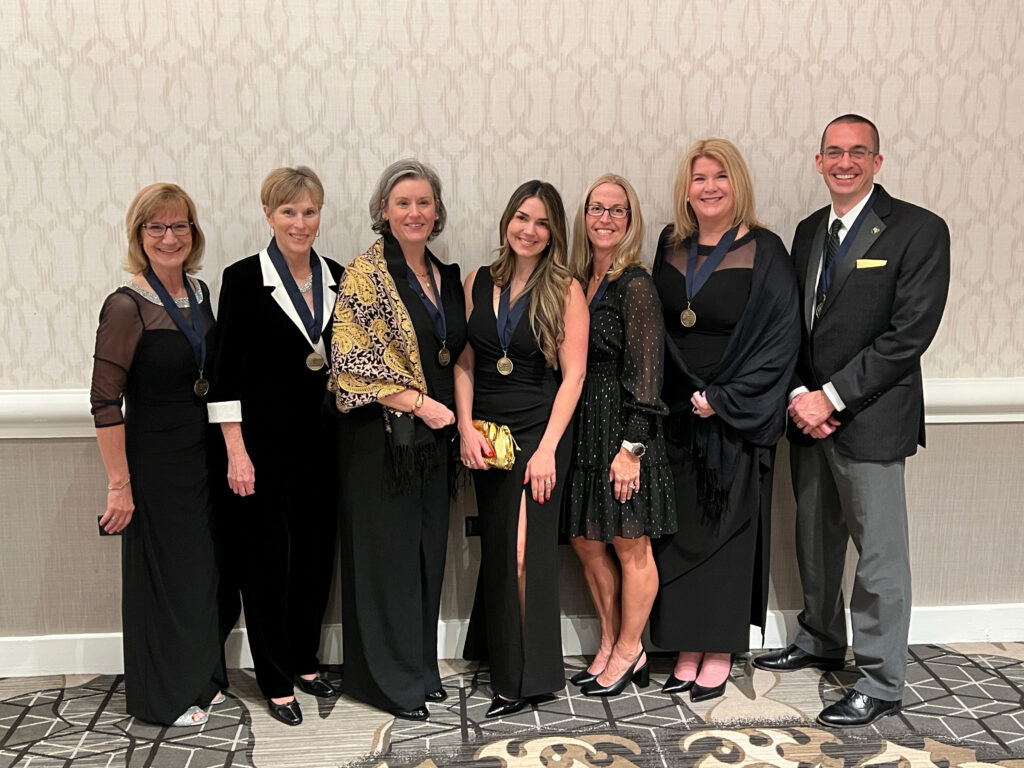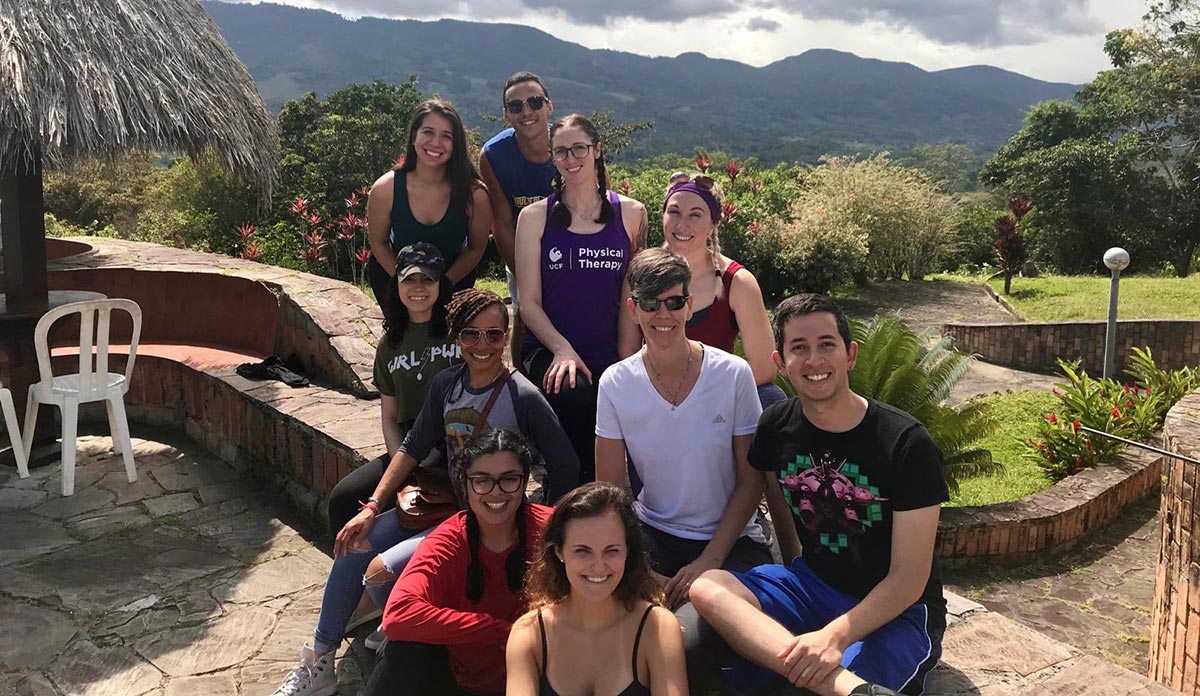
For the past three years, students in the Doctor of Physical Therapy program have traveled to Yantaló, Peru, to volunteer at a medical clinic there.
It is a chance, said Chris Doerger, an adjunct DPT faculty member who coordinated the trip for the program, for the students to provide medical care to people who likely have not been exposed to physical therapy interventions.
It is also the chance to be part of a large, interprofessional team of healthcare workers.
The eight DPT students were part of a contingent of approximately 80 students and faculty from many of UCF’s healthcare professions, including the College of Medicine and the College of Nursing, and from UF’s College of Pharmacy.
Many of the people who went to Peru have also volunteered at the Apopka Farmworkers Clinic, a twice-yearly interprofessional collaboration. For the past two years, the School of Social Work has won national prizes for their contributions to public health through the clinic.
For many of the Yantaló patients, the UCF clinic offered an opportunity to receive services not normally offered close by. And although many patients lived within 30 minutes of the clinic, there were others, Doerger said, who traveled five or six hours to receive medical care from the team.
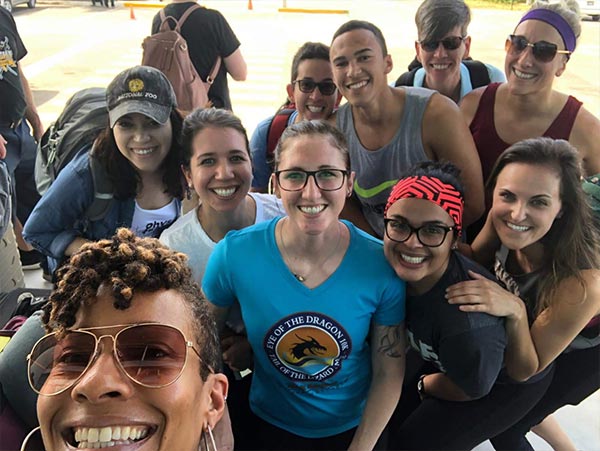
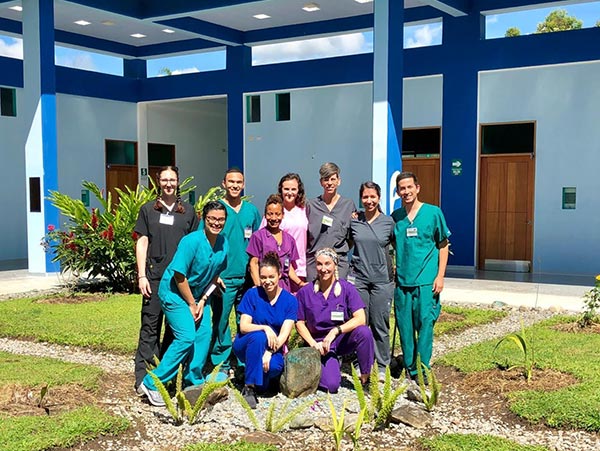
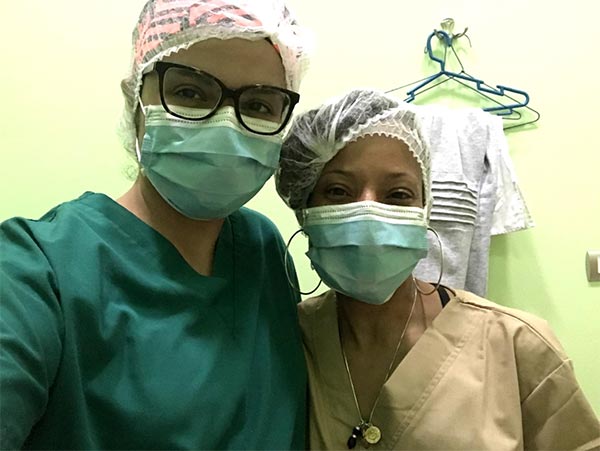
Many of the patients who were triaged to the DPT team for diagnosis and treatment had complaints of neck, back and extremity pain. These symptoms are not so different from the issues facing physical therapy patients in the US, Doerger said.
The difference, she said, is the way the clinicians respond to these patients. It requires a certain degree of innovation. There are no mandated programs like the Americans with Disabilities Act to regulate things we take for granted – street-level curbs, for example. Eight-inch curbs are not uncommon, she said, and the dirt roads can make it treacherous on persons with limited mobility.
In spite of limitations, Doerger said, she and her students are given the freedom to modify their typical interventions to better suit their patients. And sometimes, the modifications can be as simple – and as cheap – as a flexible pool noodle fashioned into a resting hand splint.
Kelly LaMaster, a third-year student in the DPT program, had previously volunteered in the Apopka clinic. LaMaster, as well as other physical therapy students, receive supervised clinical hours as part of their curriculum. Many of the supplies they use regularly during classroom training were not available in Yantaló.
“We take so much for granted,” LaMaster said. “It was inspiring, amazing and humbling. We were not able to bring all of our equipment, of course, so we were working with what we had in our pockets – often just a few rolls of TheraBand [latex-free resistance bands to improve the efficacy of therapeutic exercises].”
There were some pediatric cases where the team provided strollers and shoes for the children, and there was an older woman who visited the clinic each day for a variety of medical issues.
By the end of the week, the woman admitted she was a victim of violence. That disclosure allowed the woman to receive counseling services from the group as well as referrals for counseling in the area.
Everyone fell in love with the woman, LaMaster said. “She was straightforward and just a really wonderful human.”
The patients at the Yantaló clinic have no access to gyms or medical equipment, LaMaster said. Still, LaMaster and the other members of her team were committed to providing a “valuable, meaningful, sustainable experience” that not only helped them at that moment but gave them tips to empower their healing after the medical team departed.
“All of us were touched by the people of Peru and took something home from them,” said Emi Gonzalez Luna, a third-year DPT student. “This was an amazing opportunity.”
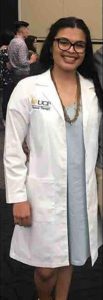 The phrase “eye-opening experience” does not even begin to describe the impact that the Peru medical mission trip has had on my personal character and my integrity as a student and future clinician. This trip is organized annually by the MedPACT group of the UCF College of Medicine, with the partnerships with UCF’s Doctorate of Physical Therapy program, College of Nursing, School of Social Work, and the UF College of Pharmacy. Since my first semester of PT school, I have been hearing about how UCF DPT gets to take part in this opportunity and I could not wait to get involved for myself. Now in my 3rd year of the program, I was honored to be one of 8 DPT students traveling to South America for this incredible adventure, which included five days spent in a sustainably run medical clinic, providing comprehensive medical care to the locals of a rural town called Yantalo, in northern Peru
The phrase “eye-opening experience” does not even begin to describe the impact that the Peru medical mission trip has had on my personal character and my integrity as a student and future clinician. This trip is organized annually by the MedPACT group of the UCF College of Medicine, with the partnerships with UCF’s Doctorate of Physical Therapy program, College of Nursing, School of Social Work, and the UF College of Pharmacy. Since my first semester of PT school, I have been hearing about how UCF DPT gets to take part in this opportunity and I could not wait to get involved for myself. Now in my 3rd year of the program, I was honored to be one of 8 DPT students traveling to South America for this incredible adventure, which included five days spent in a sustainably run medical clinic, providing comprehensive medical care to the locals of a rural town called Yantalo, in northern Peru
Many of the patients that we treated in this clinic were people dealing with chronic pain due to agricultural jobs, developmental delays in children, and chronic neurological conditions. As well, a majority of our female patients came to us with extensive histories of sexual and domestic abuse, and the psychological toll was often a major compounding factor to their chronic pain diagnoses. Many patients reported travelling up to 6 hours on foot with their entire families because they heard we were coming to staff the clinic. Rain or shine, there was always a full schedule each day we were there.
One particular patient that stands out in my mind was a woman who came to see our pelvic health PT, with primary complaints of groin and back pain, as well as jaw pain. She was an incredibly sweet woman; you could sense her warm spirit as she walked into the room. She joked around with us during the examination, and was very happy and ready to address her pain. As one of the Spanish-speaking students in the PT section of the clinic, I served as translator for the patient interview. Part of a pelvic PT interview includes screening questions regarding history of sexual or domestic abuse. When I asked these questions to our patient at the end of our interview, she hesitated but stated frankly that she had never been abused. The physical therapist and I noted this hesitation while proceeding forward with the exam.
Under the PT’s supervision, I was able to perform the external physical examination, after which she performed the internal exam. As the physical examination progressed, I stayed by the patient’s side to explain what procedures we were doing and helping to translate throughout the process. Very suddenly during the exam, the patient grabbed my hand and admitted she was sexually abused by a family member when she was younger and has never spoken about the events to anyone.
It caught me by surprise at first, and when I translated this to the physical therapist, we paused on our physical exam to ask if she wanted to elaborate on it. She remained uneasy, but slowly began to recall the history of the sexual abuse she had endured. After letting her speak her peace, we offered her the services of the amazing social workers and counselors that had accompanied us to Peru, while also assuring her that we were personally available to continue listening and discussing any aspects of her life and history that she wished to share.
We spent close to 2 hours with her, making sure that she was taken care of to the fullest extent of our abilities. However, as time ticked by, she began to worry about the impending nightfall and the dangers of traveling by local moto-taxis after dark. We couldn’t address her jaw pain issues that day, so we planned for her to come back the next day. As I walked her to the social work office for consultation, her warm spirit still managed to radiate over me, despite all we had just discussed. We continued to speak casually, with her telling me how much I reminded her of one of her grandchildren, and about how she had come into the clinic today by accident. Overall, she was extremely grateful for our help and was looking forward to seeing us the next day.
Our team’s trek to the clinic each morning involved a 40-minute bus ride along the streets of Moyobamba, where our hotel was located, and those of Yantalo. Each day, we rode by many locals preparing for their days on foot, moto-taxis, motorcycles, or bicycles. The morning after that initial encounter with this patient, we rode by a moto-taxi and there she was! She looked in the bus, scanning the faces, and waved when she met my face; she jokingly said that she would beat us to the clinic! She was our very first patient that day, and we were able to take care of her neck and jaw pain, as well as some hearing issues she had been having lately. While being treated, she admitted that she was scared of going all the way back home that previous night because she did not want to miss her opportunity to see us again in the morning. Instead, she ended up staying at a friend’s house that was near the clinic.
I am astounded and humbled by the sacrifice many of these people endured for themselves, for their families, and for their friends in order to be seen by the medical professionals at this clinic. It was commonplace to hear stories of patients walking for hours to get to the clinic, packing food for an entire day, and even staying at nearby houses with only the clothes on their backs, just as our patient had done.
The interactions I had with the locals of Yantalo, with their immeasurable kindness and hope, has stuck with me well beyond this experience, and has made me so appreciative of the luxuries we have and often take for granted here in the States. Our mission was to provide sustainable, comprehensive medical care to these people, but at the end of the day, it became so much more. Their stories were able to be told in safe spaces, their worries were able to be addressed, and many of these people introduced us to their families, friends, and private lives.
At the end of the week, this trip meant so much more than just an opportunity to practice my skills or to see a new part of the world. This experience was well beyond expectations, both in an academic sense but much more so in an emotional sense, due entirely to the interactions I had with so many of the patients I was able to treat. These people truly reinforced my initial reasons for pursuing a career in physical therapy and their stories will forever hold a place in my heart, shaping my future as a clinician. Sometimes, as I go about my day on internship at a local PT clinic here in Orlando, the patient who waved at me on the bus ride still crosses my mind and I hope she is still radiant.
~Emi Gonzalez Luna

